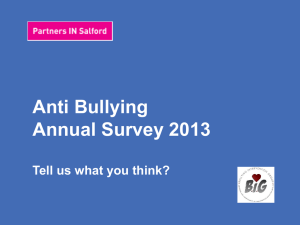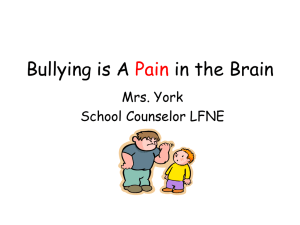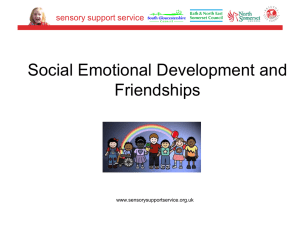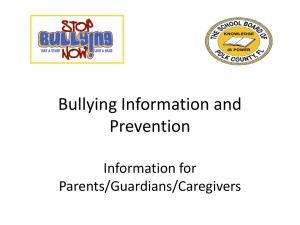Anti- Bullying
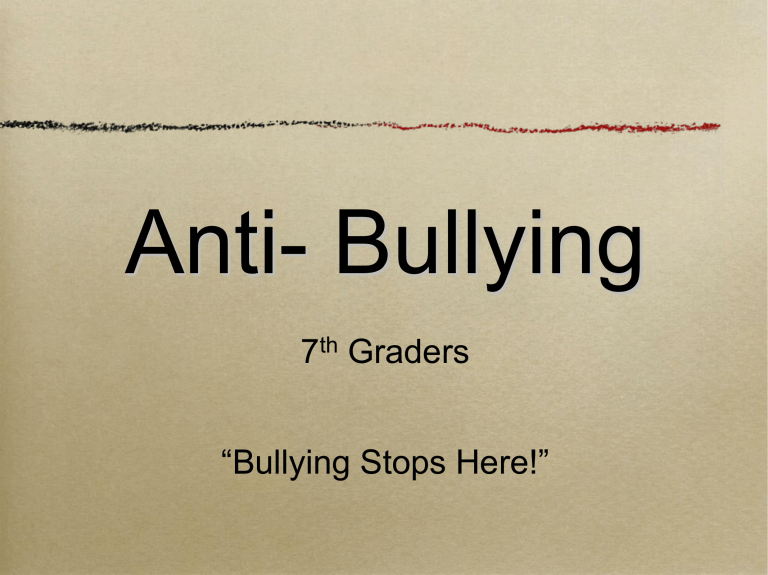
Anti- Bullying
7 th Graders
“Bullying Stops Here!”
Definition
Bullying is when kids hurt or scare other kids on purpose, and it is repeated over time. When bullying occurs there is an imbalance of power between the two students.
Stopbullying.gov
1. Bully
2. Bullied
3. Bystander
3 Roles
The Bullied Student
77% of students have admitted to being a victim of bullying
• The bullied student feels:
–Unworthy of respect, unpopular, isolated, shamed.
–Boys are less likely than girls to tell an adult.
Coloroso, Barbara (2010). The Bully, the Bullied, and the Bystander: From Preschool to High School--How Parents and Teachers Can Help
Break the Cycle (Updated Edition) (p. 49). HarperCollins e-books. Kindle Edition.
4 Markers of Bullying
• Imbalance of power
• Intent to harm
• Threat of further aggression
• Terror
The Bully
Bullying is not about anger. It’s not even about conflict. It’s often about contempt—a powerful feeling of dislike toward somebody considered to be worthless, inferior, or undeserving of respect.
Bullying can also be about an attempt to increase social status among peers or friends.
Bullying
Then & Now
H. Priebe-Diaz, Human Relations, Diversity & Equity
Types of Bullying
• Verbal Bullying
• Non-Verbal Bullying
• Physical Bullying
• Relational Bullying
• Cyber Bullying
Cyber Bullying
• Stop-
• Facebook, emails, text messages, IM, Ask FM, any electron form of communication
• Block-
• Tell-
• NOTE: Cyber bullying is more than a school issue it is a legal issue. Police can become involved if it is founded that cyber bullying has occurred
• Stop- Stop communicating
• Block- Block them from your contacts
• Tell- Tell an adult
Verbal Bullying
May include:
Hurtful namecalling, teasing, gossiping, making threats, making, rude noises, taunting, racial slurs, sexual comments.
Physical Bullying
May include:
Hitting, punching, pushing, shoving, poking, kicking, tripping, strangling, hair pulling, fighting, beating, biting, spitting.
Relational Bullying
May include:
Rejecting, terrorizing, extorting, defaming, intimidating, humiliating, blackmailing, manipulating friendships, isolating, ostracizing, using peer pressure, or rating or ranking personal characteristics.
Girl Drama
& Relational bullying
•
Cliques
•
Isolating
• ganging up
• siding
•
Teasing
•
Clothes
•
Body image
Not all drama is bullying.
Tug-A-War Activity
Anne
James
Cindy
Katie
John
Bystander
• Over 6 million American schoolchildren have been bullied in the past six months. Whether you cheer on the bully, or silently watch, you are supporting the bully.
What can a bystander do?
Try to diffuse the situation.
If you can, stand up to the bully and let them know that it's not okay. Take a stand
–“What you are doing is not right”
–“Knock it off.”
Report it at school
Refuse to watch
Don’t join in.
Support the victim. Let them know you care and you don't think what happened to them was fair or right.
Solution to ending bullying
R
ecognize
R
efuse
R
eport
R ecognize
R espond
R eport
Staff Referral
Teacher and
Assistant
Principal
Investigation
Consequence
Communication
Documentation
Counselor
Victim
Support
Teach Resiliency
Bully
Bullying Report Process
• 1. Target/ Bystander makes a report by filling out a witness statement
• 2. Counseling support will be offered if the student is in crisis
• 3. Investigation is conducted by Assistant Principal
Cooper
• 4. If bullying has occurred it is documented and consequences are given
Review
• What can you do if you witness bullying at school? What is the definition of a bully?
• Out of the 3 roles of bullying, the Bully, the
Bullied, and the Bystander, who has the greatest impact in helping to end bullying?
• How can a bystander help end bullying?
• How do you make a report of bullying?
THINK before you speak.
Everyone has the right to feel safe coming to school.
Our school is a great place to learn, play and have friends.
Nobody likes to be bullied

